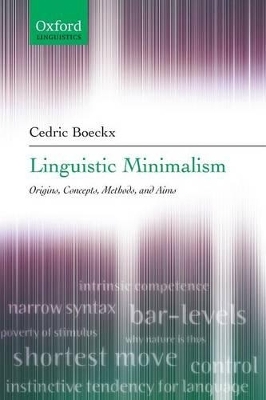
Linguistic Minimalism
Oxford University Press (Verlag)
978-0-19-929758-0 (ISBN)
The Minimalist Program for linguistic theory is Noam Chomsky's boldest and most radical version of his naturalistic approach to language. Cedric Boeckz examines its foundations, explains its underlying philosophy, exemplifies its methods, and considers the significance of its empirical results. He explores the roots and antecedents of the Program and shows how its methodologies parallel those of sciences such as physics and biology. He disentangles and clarifies current debates and issues around the nature of minimalist research in linguistics and shows how the aims and ambitions of the Minimalist Program lie at the centre of the enterprise to understand how the human language faculty operates in the mind and is manifested in the world's languages.
Professor Boeckx writes for advanced and graduate students of linguistics and for all those, in fields such as cognitive science and evolutionary biology, who want to know more about current developments in theoretical linguistics.
Cedric Boeckx is Assistant Professor of Linguistics at Harvard University, and a member of the Mind-Brain-Behavior Initiative. He received his PhD from the University of Connecticut in 2001. He has held visiting positions at the Universities of Illinois and Maryland. His main research interests are in theoretical syntax, comparative grammar, and architectural questions of language, including its origins and its development in children, as well as its neurobiological basis. He is the author of Islands and Chains (2003) and, with Howard Lasnik and Juan Uriagereka, A Course in Minimalist Syntax (2005). He is co-editor with Kleanthes K. Grohmann of Multiple Wh-fronting (2003) and has published mumerous articles in journals such as Linguistic Inquiry and Natural Language and Linguistic Theory.
1. The Minimalist Gamble ; 1.1 Minimalism in a nutshell ; 1.2 How to approach minimalism ; 1.3 Author's aims ; 2. The Minimalist roots ; 2.1 The birth of modern biolinguistics ; 2.2 Levels of Adequacy ; 2.3 The Poverty of Stimulus, and what must be done about it ; 2.4 Computational properties of the language organ ; 2.4.1 Early results ; 2.4.2 Later developments ; 2.4.3 Parameters ; 2.5 Conclusion ; 3. The Minimalist Core ; 3.1 The Minimalist Core ; 3.1.1 The Minimalist Core ; 3.1.2 Some Generalizations ; 3.2 Taking stock ; 3.3 The notion of 'program' and how it applies to minimalism ; 3.3.1 Program vs. Theory ; 3.3.2 Lakatos on research programs ; 3.4 Conclusion ; 4. The Minimalist Impact ; 4.1 The Galilean Style in science ; 4.2 Why-questions ; 4.3 Beauty in science ; 4.4 The Galilean Style and Biology ; 4.4.1 Linguistics as biology ; 4.4.2 Two scientific cultures ; 4.4.3 Back to Laws of Form ; 4.4.4 The evolution of the language faculty ; 4.4.5 Language and cognition ; 4.5 Conclusion ; 5. Minimalist Highlights ; 5.1. Caveat lector ; 5.2. Evaluating the objections to the program ; 5.3. Specific minimalist analyses ; 5.3.1. Control ; 5.3.2. Copies and linearization ; 5.3.3. A constraint on multiple wh-fronting ; 5.3.4. Successive cyclicity ; 5.3.5. Bare Phrase Structure ; 5.3.6. Sluicing ; 5.3.7. Parasitic gaps ; 5.3.8. Existential constructions ; 5.4. Conclusion ; 6. The minimalist Seduction
| Erscheint lt. Verlag | 1.9.2006 |
|---|---|
| Verlagsort | Oxford |
| Sprache | englisch |
| Maße | 156 x 233 mm |
| Gewicht | 393 g |
| Themenwelt | Geisteswissenschaften ► Philosophie ► Sprachphilosophie |
| Geisteswissenschaften ► Sprach- / Literaturwissenschaft ► Anglistik / Amerikanistik | |
| Geisteswissenschaften ► Sprach- / Literaturwissenschaft ► Sprachwissenschaft | |
| ISBN-10 | 0-19-929758-4 / 0199297584 |
| ISBN-13 | 978-0-19-929758-0 / 9780199297580 |
| Zustand | Neuware |
| Haben Sie eine Frage zum Produkt? |
aus dem Bereich


